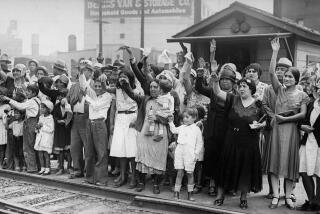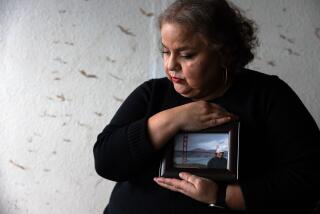PLO Deportation Hearing Will Resume
An immigration appeals board has ruled that the constitutional rights of eight Los Angeles-area immigrants accused of belonging to a Marxist faction of the Palestine Liberation Organization were not violated during the course of their deportation proceeding here and that the suspended hearing should resume.
A unanimous four-member Board of Immigration Appeals in Falls Church, Va., rejected the contention of the immigrants’ lawyers that stopping, and then restarting, the deportation hearing last year, in effect, constituted double jeopardy.
The lead counsel for the eight immigrants, Los Angeles attorney Dan Stormer, said Tuesday “it’s my belief” that an appeal will be filed, which could further delay the proceedings. “It’s a gross miscarriage of justice,” he said.
The immigrants’ arrests in January, 1987, and their subsequent brief detention at the Terminal Island Federal Prison caused a national uproar in the Arab community and among civil rights groups.
All eight immigrants had originally been charged under the McCarran-Walter Act with advocating world communism because of their alleged association with the PLO faction, the Popular Front for the Liberation of Palestine--an accusation they all denied.
As the proceeding got under way in U.S. Immigration Court here last year, the government modified its charges, accusing two of the eight with subversion and moving to deport the other six on a variety of immigration violations.
A Justice Department attorney leading the prosecution team, William P. Joyce, said the government is still prepared to present evidence showing that the group’s two alleged ringleaders, Khader Hamide, 34, of Los Angeles, and Michel Shehadeh, 32, of Long Beach, “are members of the PFLP, which we consider to be a terrorist organization, and we’d like them out of the country.”
Joyce, the Immigration and Naturalization Service’s associate general counsel, said in a telephone interview from Washington that the government, which has not yet presented its evidence against the two, is basing its case on “more than just FBI surveillance. We’re prepared to show a link with the PFLP.”
The decision of the immigration appeals board was made on Oct. 7, and is just now being circulated to defense attorneys and Justice Department lawyers.
It stemmed from an explosive moment during the trial, on May 11, 1987, when government prosecutors refused to produce a key immigration official, whom the immigration judge, Ingrid K. Hrycenko, had ordered to testify. The official was supervising criminal investigator Gilbert Reeves, who, in December, 1986, had signed the original arrest orders for the eight immigrants.
Defense attorneys had claimed that their clients were being selectively prosecuted for their unpopular political views, and they wanted to question Reeves about the government decision to arrest the defendants.
Hrycenko, in a burst of anger, then dismissed charges against the eight immigrants.
The same government charges were refiled the following day, May 12, with one change--the new arrest orders were signed by the INS’ Los Angeles district director, Ernest Gustafson. Defense lawyers then appealed, arguing that restarting the case was double jeopardy and therefore unconstitutional.
But in its eight-page ruling, the immigration appeals board said prosecutors were “not attempting to ‘start over,’ ” but rather “corrected” the signature on the arrest orders--changing it to Gustafson instead of Reeves.
More to Read
Sign up for Essential California
The most important California stories and recommendations in your inbox every morning.
You may occasionally receive promotional content from the Los Angeles Times.










